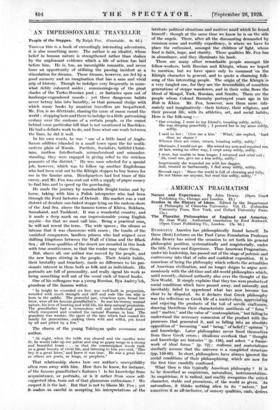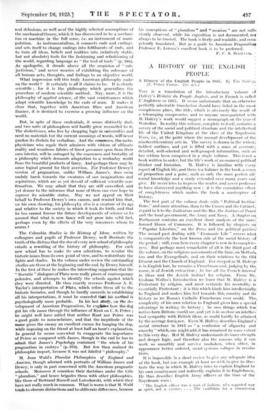AMERICAN PRAGMATISM
The Pluralist Philosophies of England and America. By Jean Wahl. Authorized translation by Fred Rothwell. (Open Court Publishing Co., London. 12s. 6d.)
EVIDENTLY America has philosophically found herself. In these (first) Lectures on the Paul Carus Foundation Professor John Dewey has seized the occasion to set forth his general philosophic position, systematically and magisterially, under the title, Nature and Experience. Thus American PragmatisM, under his leadership, has passed out of the stage of polemic and controversy into that of calm and confident exposition. It is conscious of being the philosophy which reflects the actualities of AmeriCan civilization, and no longer deigns to argue acri- moniously with the old-time and old-world philosophies which, until recently, claimed authority also over the thought of the New World. It simply explains that they too were products of social conditions which hive passed away, and naturally and inevitably, failed to apprehend what has now become too Clear to be disputed. So it declares that Greek philosophy was the reflection on Greek life of a Mister-class, aPpreciating and enjoying the products of the toil of servile craftsmen, drawing therefrom their characteristic antithesis of " form ". and " matter," and the value of "contemplation," but failing to understand the necessary connexion of the product with the processes that generated it, and so falling into an absolute opposition of " becoming " and " being," of belief (" opinion ") and knowledge. Later philosophies never freed themselVes from these Greek errors ; idealisms overlook that " thought and knowledge are histories " (p. 158), and adore " a frame- work of ideal forms " (p. 72) ; realismS. and materialisms similarly assume that the universe is a completed structure (pp. 159-60). In short, philosophers have always ignored the social conditions of their philosophizing, which are now for the first time candidly confessed.
What then is this typically American philosophy ? It is to be described as empiricism, naturaliim, instrumentalism. As empiricism, it is 'radical;and readily recogniies the mixed character, stable and precarious, of the world as given. As naturalism, it thinks nothing alien to its " nature," 13ut conceives it as all-inclusive, of sensory qualities, ends, desires
and delusions, as well as of the highly selected assumptions of the mechanical theory, which it has discovered to be a mechan- ism or machine in the full sense, i.e. an instrument of mani- pulation. As instrumentalism, it connects ends and endings, and sets itself to change endings into fulffiments of ends, and to turn all ideas, beliefs and realities into (relatively stable, but not absolute) tools for the fashioning and refashioning of the world, regarding language as " the tool of tools " (p. 186). As apologetic, it dreads above all the suspicion of sub- jectivism," and never wearies of exhibiting the reference of all human acts, thoughts, and feelings to an objective world.
What impression will this truly American philosophy make on the world ? It certainly is all it claims to be. It is clearly scientific ; for it is the philosophy which generalizes the procedure of modern scientific method. Nay, more, it is the philosophy of applied science, of the vast contrivances which adapt scientific knowledge to the ends of man. It makes it clear that, together with American films and American finance, it is destined to exercise a growing influence on the world.
But, in spite of these credentials, it seems distinctly drab, and two sorts of philosophers will hardly grow reconciled to it, The dialecticians, who live by chopping logic in universities and need no materials but the current meanings otwords, will never pardon its disdain for verbalism. And the ?mowers, the, meta- physicians who regale their admirers with visions of ultimate reality and wondrous fabrics of finest gossamer spun from their own interior, will be outraged by the coarseness and brutality of a philosophy which demands adaptation to a workaday world from the beautiful products of fancy. And perhaps there may be some logical ground for their aversion. Pair Piofes:soi Detrey'i version of pragmatism, unlike William James's, does seem unduly harsh towards the creatures of our imaginations and aspirations, which are as yet devoid of sufficient scientific con- firmation. We may admit that they are still unverified, and yet demur to the inference that none of them can ever hope to mprove its scientific status. May we not appeal on their behalf to Professor Dewey's own canons, and remind him that, on his own showing, his philosophy also ,is a creature of its age and relative to the society in which it took its birth, and that he too cannot foresee the future developments of science or. Fe assured that what is now fancy will not grow into solid fact, perhaps even by the efforts of the very romancers whom he scorns ?
The Columbia Studies itt the History of Ideas, written by colleagues and pupils of Professor Dewey, well illustrate the truth of the dictum that the rise of every new school of philosophy entails a rewriting of the history of philosophy., For each new school has to make its own selections,' to revalue the historic issues from its own point of view, and to redistribute the lights and shades. In the volume under review the outstanding studies are those at the beginning and the end, by Dewey himself. In the first of these he makes the interesting suggestion that the " Socratic " dialogues of Plato were really pieces of contemporary. polemics, and attempts to identify the schools against which they were directed. He thus exactly reverses Professor A. E. Taylor's interpretation of Plato, which refers them all to the historic Socrates, and though he hardly succeeds in establishing all his interpretations, it must be conceded tbI this method is psychologically more probable. In his last tintdy, on Ole de- velopment of American Pragmatism, he explPiihtr how tile- dog got his vile name through the influence of Kant on C. S. Peirce ; he might well have added that neither Kant nor Peirce was a good guide to nomenclature, and that the ineptitude of the -name gives the enemy an excellent excuse for hanging the dog, 'while imposing on the friend at least half an hour's explanation. In general he seems somewhat to exaggerate the importance of Peirce as compared with James, though in the end he has to _admit that James's Psychology contained " the whole of his pragmatism in embryo " (p. 870). But few then realized its philosophic import, because it was not labelled " philosophy."
M. Jean Wahl's Pluralist Philosophies of England and America, though adorned with portraits of William James and Dewey, is only in part concerned with the American pragmatic schools. Moreover it considers their doctrines under the title " pluralism," and hence brigades them with other philosophies, like those of Bertrand Russell and Lutoslawski, with which they have not really much in common. What is worse is that M. Wahl tetnisto obscure distinctions and to obliterate differences, because his conceptions of " pluralism " and " monism " are not suffi- ciently clear-cut, while his exposition is not documented, not always to be trusted. The book is lively and readable, and com: petently translated. But as a guide to American Pragmatism Professor E. Leroux's excellent book is to be preferred.
F. C. S. Sour.i.e.a.



















































 Previous page
Previous page